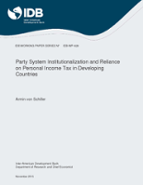Party System Institutionalization and Reliance on Personal Income Tax in Developing Countries
Date
Dec 2015
This paper explores the effect of party system institutionalization on the relevance of the personal income tax in the tax composition. Based on a fiscal contractualism approach, it is argued that institutionalized political party systems increase the capacity of political actors to credibly commit to fiscal contracts agreed with wealthy taxpayers. Consequently, in countries characterized by institutionalized political party systems wealthy taxpayers accept paying a bigger share of the tax burden, as reflected in a greater relevance of progressive tax types. The analysis of panel data for more than 90 countries from 1990 to 2010 supports this hypothesis, showing that party system institutionalization has an especially significant and strong positive effect on the relevance of the personal income tax where bureaucratic capacity is low. At high levels of bureaucratic capacity the effect disappears. The findings strongly support the claim that, particularly in developing countries, where bureaucratic capacity tends to be limited, taxation is best understood as a problem of credible commitment.



